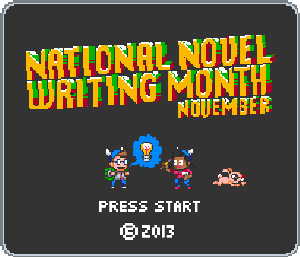Like most folks in the Snowbelt, November is the month to hunker down, to refamiliarize ourselves with long, winter nights; the quiet of a crystalline moon, the indistinct rustle of dried oak leaves still clinging to branches, the kick and comfort of the furnace. It is a poet's month.
 For three years, I have participated in National Novel Writing Month (NaNoWriMo). In 2009, I took the challenge of writing 50,000 words by month's end or 1,700 words daily. I worked on a story idea, set in Cherokee, NC, at the foot of the Smoky Mountains. I managed just over 51,000 words and haven't looked at it since.
For three years, I have participated in National Novel Writing Month (NaNoWriMo). In 2009, I took the challenge of writing 50,000 words by month's end or 1,700 words daily. I worked on a story idea, set in Cherokee, NC, at the foot of the Smoky Mountains. I managed just over 51,000 words and haven't looked at it since.The year Jeff died, my days were full of words and sorrowed poems and I spent that November taking the NaNoWriMo poem-a-day challenge. I do not participate in the online community, but I did use prompts from Robert Brewer, an editor with Writer's Digest magazine.
For poets, the idea of writing a poem a day is terrifying (I hear this from other poets whenever I mention
doing the challenge). It's a masochistic marathon, really. Poets love to ponder words and lines, images and ideas; they wait for inspiration. If you're writing a poem every day, you're taking inspiration from whatever, wherever you can.
I would read the prompt each morning and then spend the day thinking about it, sometimes an idea would form quickly and other times, nothing. Some prompt were absolutely meaningless (I don't write political poems or limericks or haiku). One prompt, that year, on 11/11/11, was to write a math poem. I'm a poet, for pity's sake, I hate math (but I did write a poem using mathematical terms and it is one of the best poems to come from that year).
Last year, my friend Kathe R. took the challenge with me. At the end of November, each week through mid-January, we would send one another five of the poems for critiquing.
I'm a sporadic poet, at best, but in two years, I've written 60 poems. Most poetry manuscripts are a minimum of 48 poems. Let me be honest, out of those 60 poems, I consider two of them exciting, and maybe eight poems are good. Three of these poems have been published. Another dozen are worthy of a second look and some refining. At roughly thirty percent (I can do some math); for any poet to write 32 half-decent poems in a year is something to celebrate.
In less than a week, the challenge goes up again and I've had a prompt idea since September (ekphrasis, I bore easily). I'm nervous about keeping up my end of the bargain, it's not like I can carbo-load for this or do any stretches (I did draft a poem this week just to keep the wheels greased).
Afternoons pass quickly now, and night folds over the Big Woods without much warning, and I will sit in November's chill-black and write poems (and I'm going to participate in Movember). I say, bring it.

.jpg)



